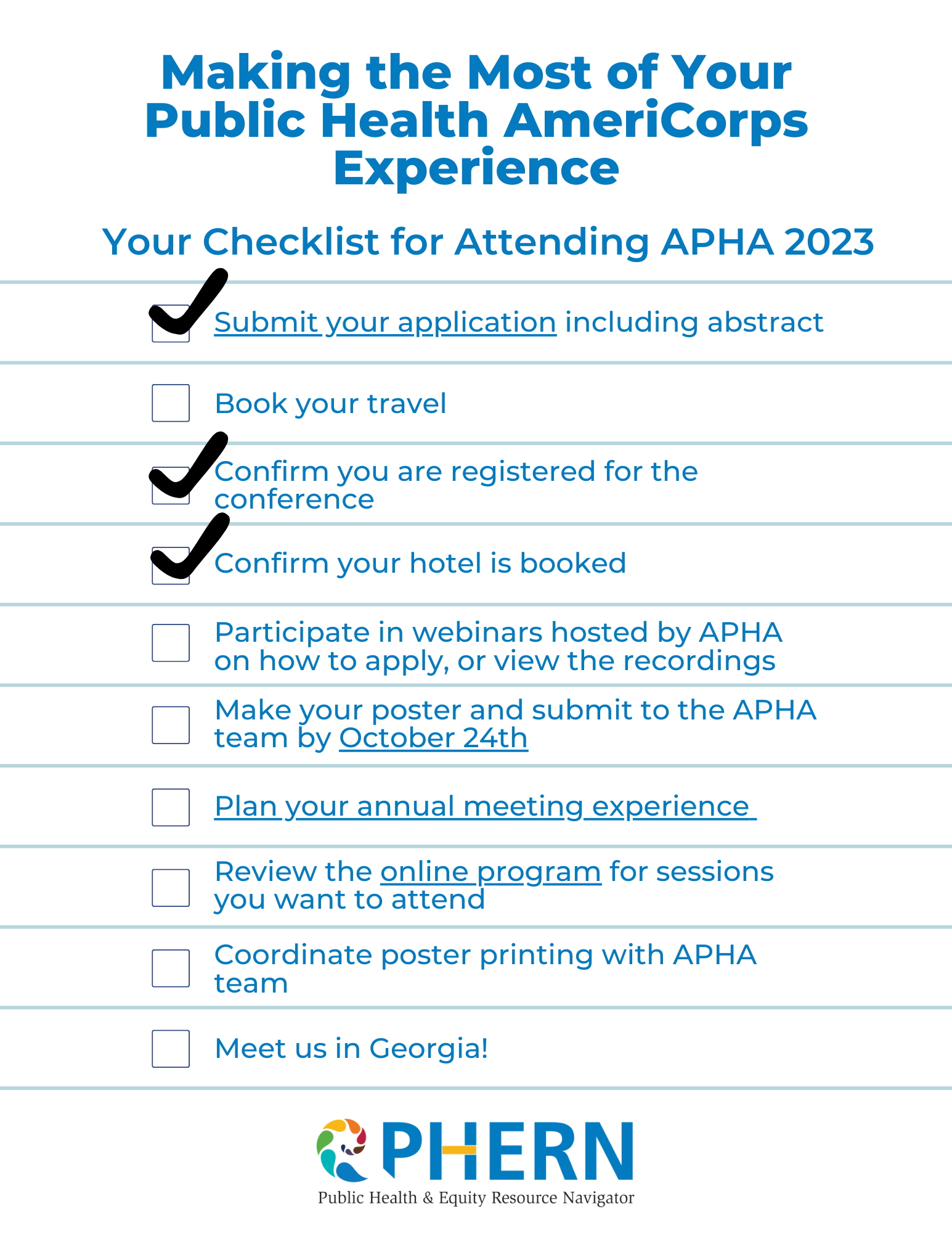Guide to Success:
APHA Annual Conference and Expo
Public Health AmeriCorps
at the APHA Annual Conference and Expo 2023
The Opportunity
Public Health AmeriCorps and the American Public Health Association are helping to grow a new generation of public health leaders. Over the coming year, the two organizations will collaborate on several opportunities for Members including a webinar series and information and resources here on PHERN. Members will ALSO have the chance to attend and present at the APHA Annual Meeting and Expo.
PHA on PHERN
The Public Health and Equity Resource Navigator or PHERN is a free public website that includes 1000+ tools, resources, and stories on important and emerging public health topics curated for the field. New resources of interest to Members will be curated as part of the partnership between APHA and PHA. Over the coming months, we will be adding resources for you to the Portal. Favorite the page and check back here often for updates.
Attend the APHA Annual Meeting
APHA is proud to partner with Public Health AmeriCorps at the APHA Annual Meeting and Expo this year. As part of the collaboration, a cohort of Members will be sponsored to attend this year’s event and present posters about relevant projects or programs they were involved with at their host site.

What is the APHA Annual Meeting?
The APHA Annual Meeting and Expo brings together more than 12,000 public health professionals from across the world to engage, collaborate and grow through educational and networking opportunities. This year’s meeting will be held November 12-15, 2023 in Atlanta, Georgia. This year’s theme is Overcoming Social and Ethical Challenges.

Why Attend?
Attending a scientific conference is a wonderful opportunity to learn about public health science and connect with a large community of peers. Attending conferences can be especially meaningful for early career professionals as they begin to build their professional networks and learn about opportunities in the field.
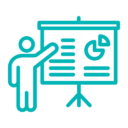
Why Present?
Presenting at a scientific conference is an honor. It is an opportunity to share your work in a professional, scientific forum. Presenting at a conference is a professional accolade that looks good on a resume.
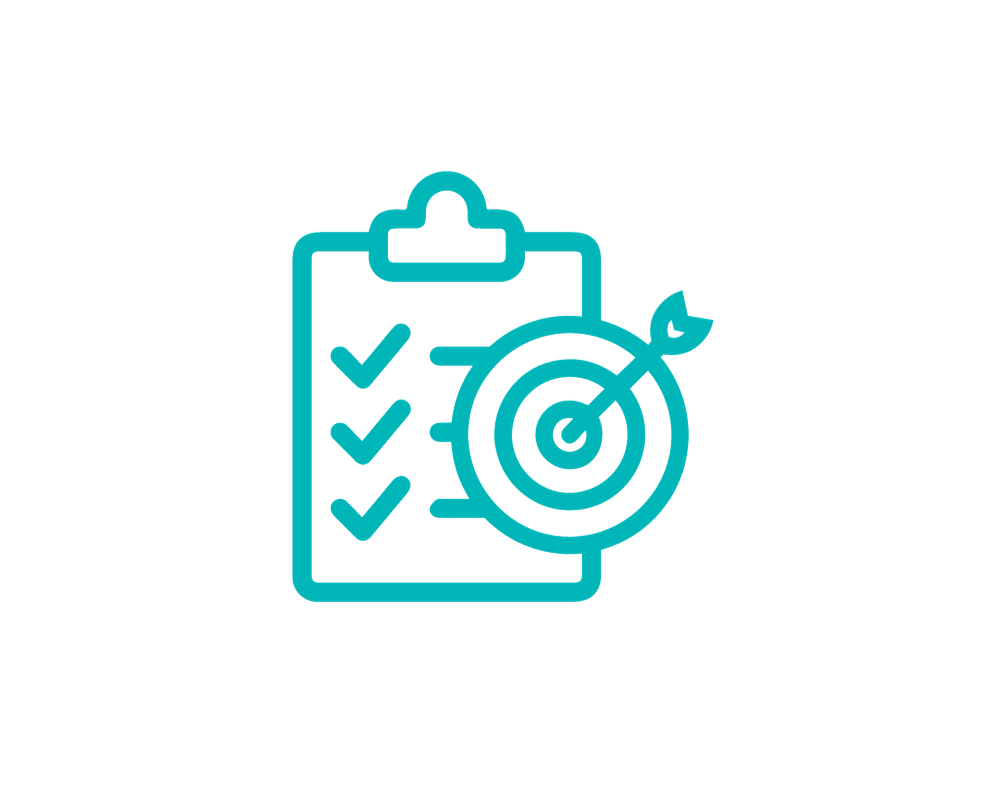
Plan Your Experience
Are you ready to join us in Atlanta? The Annual Meeting is full of opportunities to engage, collaborate and grow with your public health community.
Use this page to plan for a successful meeting experience.
Review the online program to find sessions you want to attend. You can also find your own poster abstract on the program too!
Scholarship recipients announced by: Have been announced
A cohort of 20-30 Members have been accepted for scholarship to the 2023 APHA Annual Meeting and Expo.
- Deadline for submission: Applications are now closed
- Scholarship recipients announced by: Have been announced
What is an abstract?
Abstracts are written for a variety of purposes (research papers, posters) and applications (conference presentations, academic journals), and thus vary in terms of their content. Generally, abstracts contain background information, pose central questions or a statement of the problem, discuss what you did and why, and summarize results or findings and reflect on their significance.
Abstracts about policy, programs, interventions and other types of research evaluations of the sort you will be writing might include the following elements:
- Issues – Include a short summary of the issues centered or addressed by your project, experience, service or advocacy program
- Description – Describe the project, experience, service or advocacy program
- Lessons learned – Describe the results of the project and any lessons learned
- Recommendations – Name your next steps and recommendations
Get started
Getting started is always the hardest part. Begin by asking yourself the following questions and reflecting on your experience at your host site:
- Activities – What are you doing?
- Audience – Who are you doing it for?
- Impact – Why are you doing it?
- Lessons Learned – How could this inform other projects?
Given this year’s APHA Annual Meeting theme is Overcoming Social and Ethical Challenges, consider how your work may have addressed social or ethical challenges.
To help generate ideas, it can be helpful to put pen to paper (literally or digitally). APHA recommends listing out activities at your host site and potential abstract topics and titles. Workshop a few abstract ideas. Maybe try them out on a peer or colleague and ask for feedback. Once you decide on direction, you’re ready to get writing! See the resources below for more information and tips on writing an abstract.

Writing an Abstract for Your Research Paper

How To Write an Abstract: 4 Tips for Writing an Abstract

Tips for Writing an Excellent Conference Abstract
What is a poster?
Academic posters are a form of academic expression. They summarize research projects and other professional work in a large-scale print format and are often presented at academic and professional conferences. Using text, tables, and images, posters present information in a visual way. They convey what was done, how it was done, and what was learned. You can think of them as a visual version of an abstract!
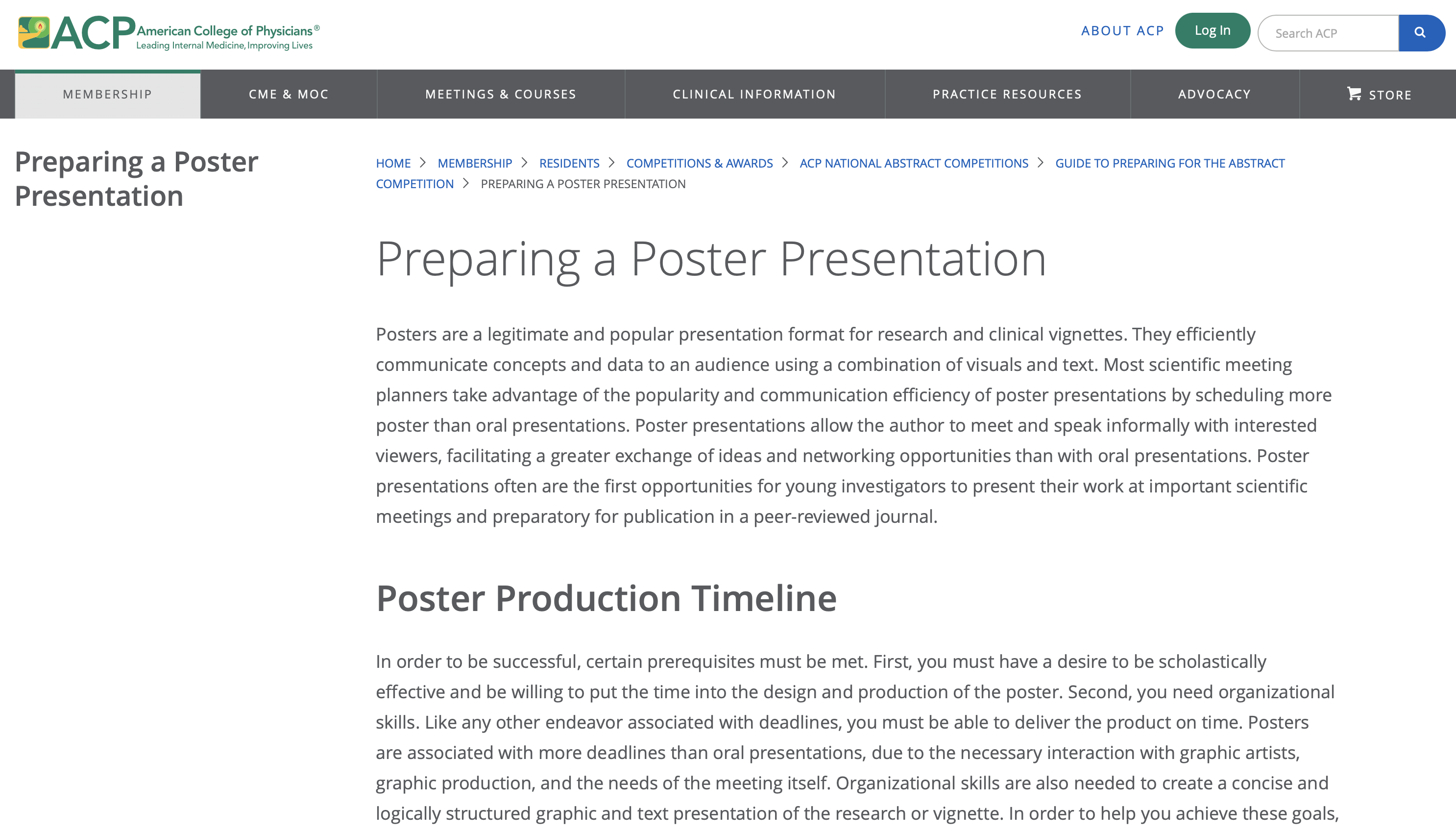
Preparing a Poster Presentation
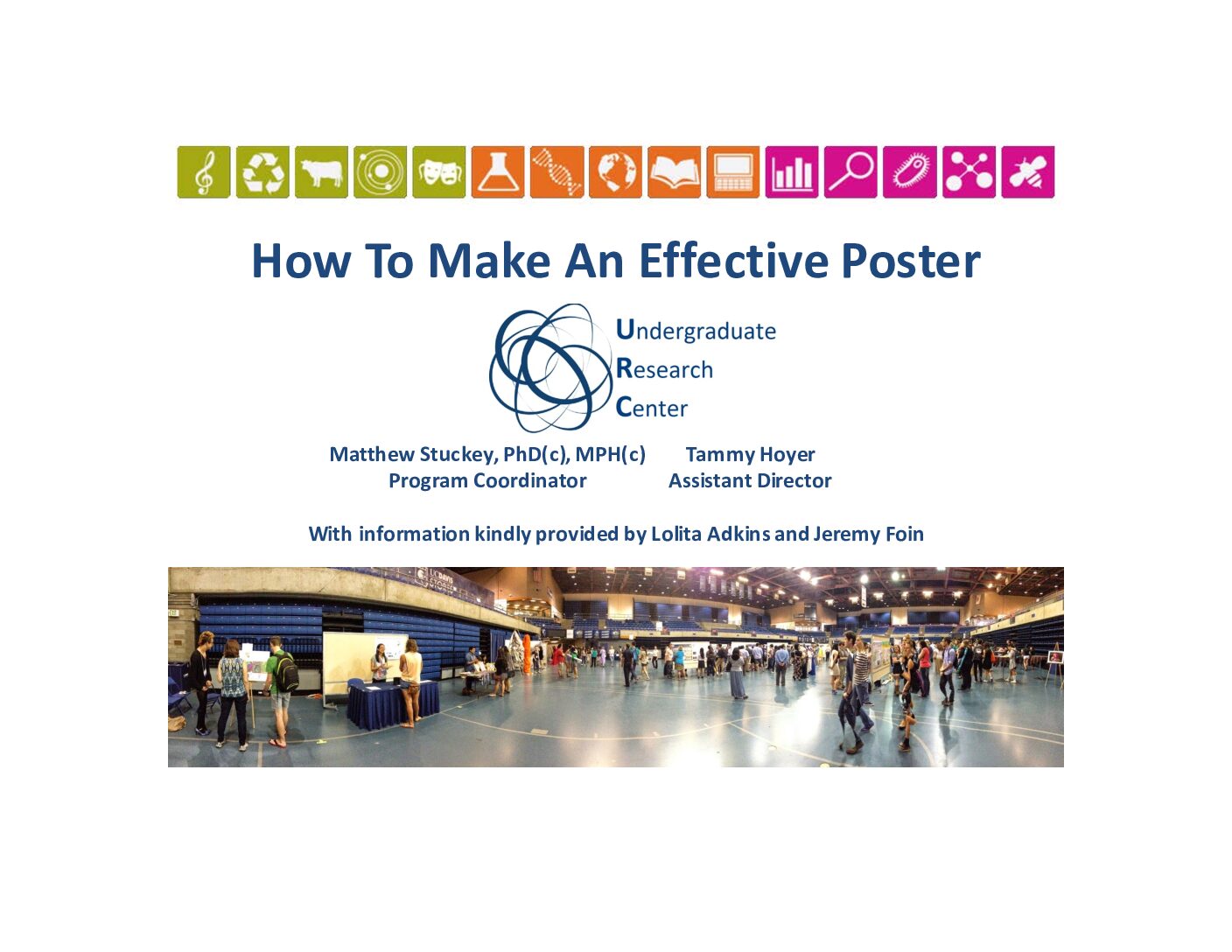
How To Make an Effective Poster
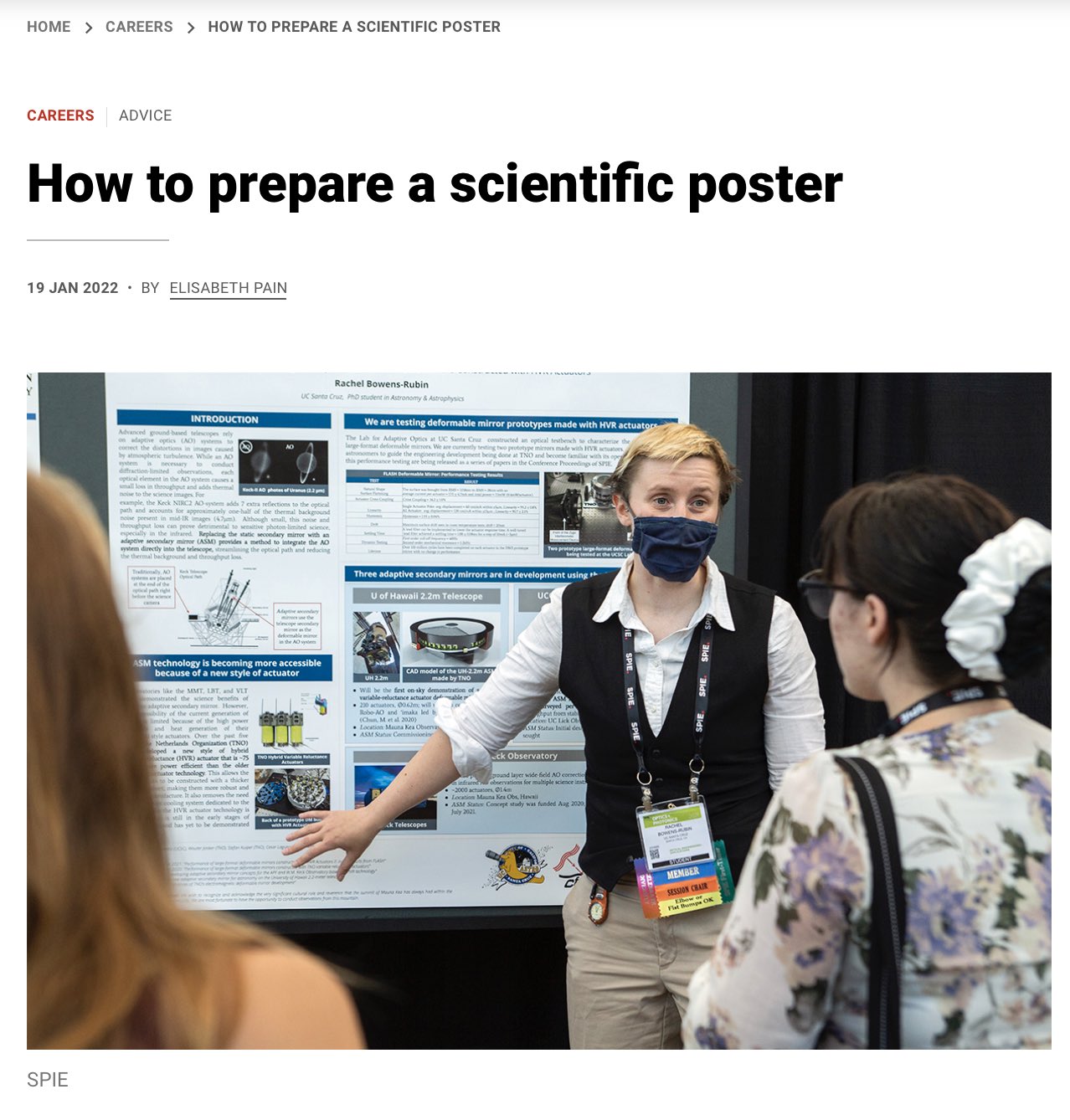
How To Prepare a Scientific Poster
How to create a poster
Like abstracts, posters are created for a variety of purposes (e.g., research projects, program evaluations) and thus vary in terms of content. Information presented on a poster is typically organized into sections that provide background on the project, describe the methods used, present results, and highlight important takeaways.
Posters often use a combination of text, tables, images, and graphic elements to present information. The most successful posters use a mix of images and text. It is recommended that poster content be 60% images (graphs, charts, tables, photographs) and 40% text. Keep in mind that text and images should be readable from 3-5 feet away. This means using relatively large fonts (e.g., 24+ point font for body text), clean, legible images, and plenty of white space.
Posters can be designed and created with software such as Microsoft PowerPoint, Google Slides, Adobe Illustrator, and Canva. These programs enable users to bring multimedia compositions together into a poster document.
Poster submissions are due to the APHA team by October 30, 2023.
Get started
Between poster design and multimedia elements, getting started can be daunting. Get started by thinking through the following:
- Consider Your Content – Your poster’s content is summarized by your abstract. Think about what information is most important to present. What aspects avail themselves to graphs, tables, photographs, or other imagery? Start a list of the elements to include. You might find it helpful to sketch your poster as a way to organize your ideas.
- Plan Your Poster – Determine which software you will use to create the poster. What software are you comfortable with using to design the poster? What do you have access to? (If you are new to design, try Canva, a user-friendly, web-based application [with a great free version!] that has a large selection of templates and design elements.) What other software (e.g., data visualization to create) or assets (e.g., logos, photographs) might you need?
- Develop Your Design – Review poster requirements for your conference or meeting to ensure that you design to all criteria (e.g., poster size, image requirements, resolution requirements). You are now ready to dive into the design. It can be helpful to get inspired by looking at other posters or templates available through your chosen software application.
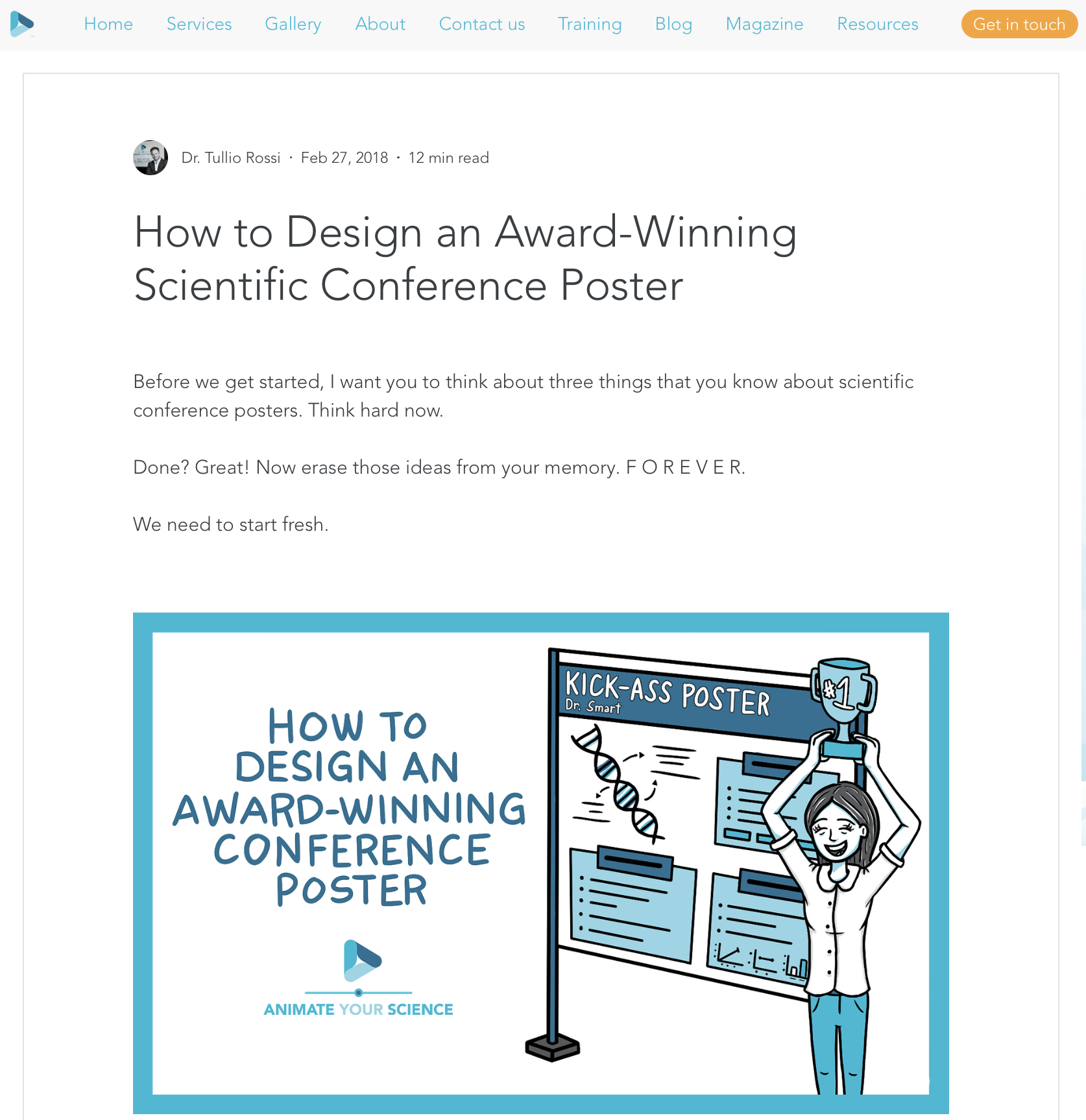
How To Design an Award-Winning Scientific Conference Poster
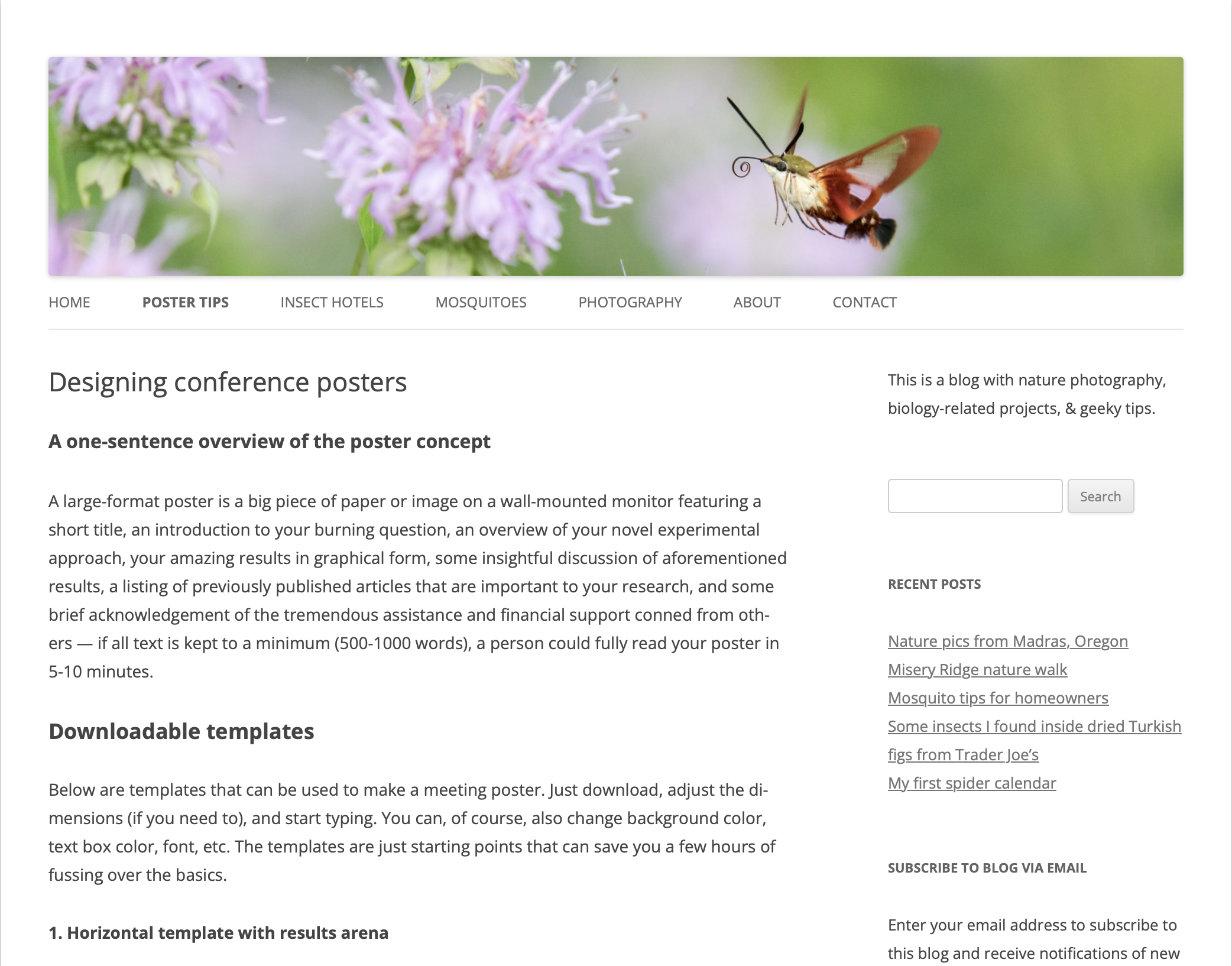
Designing Conference Posters
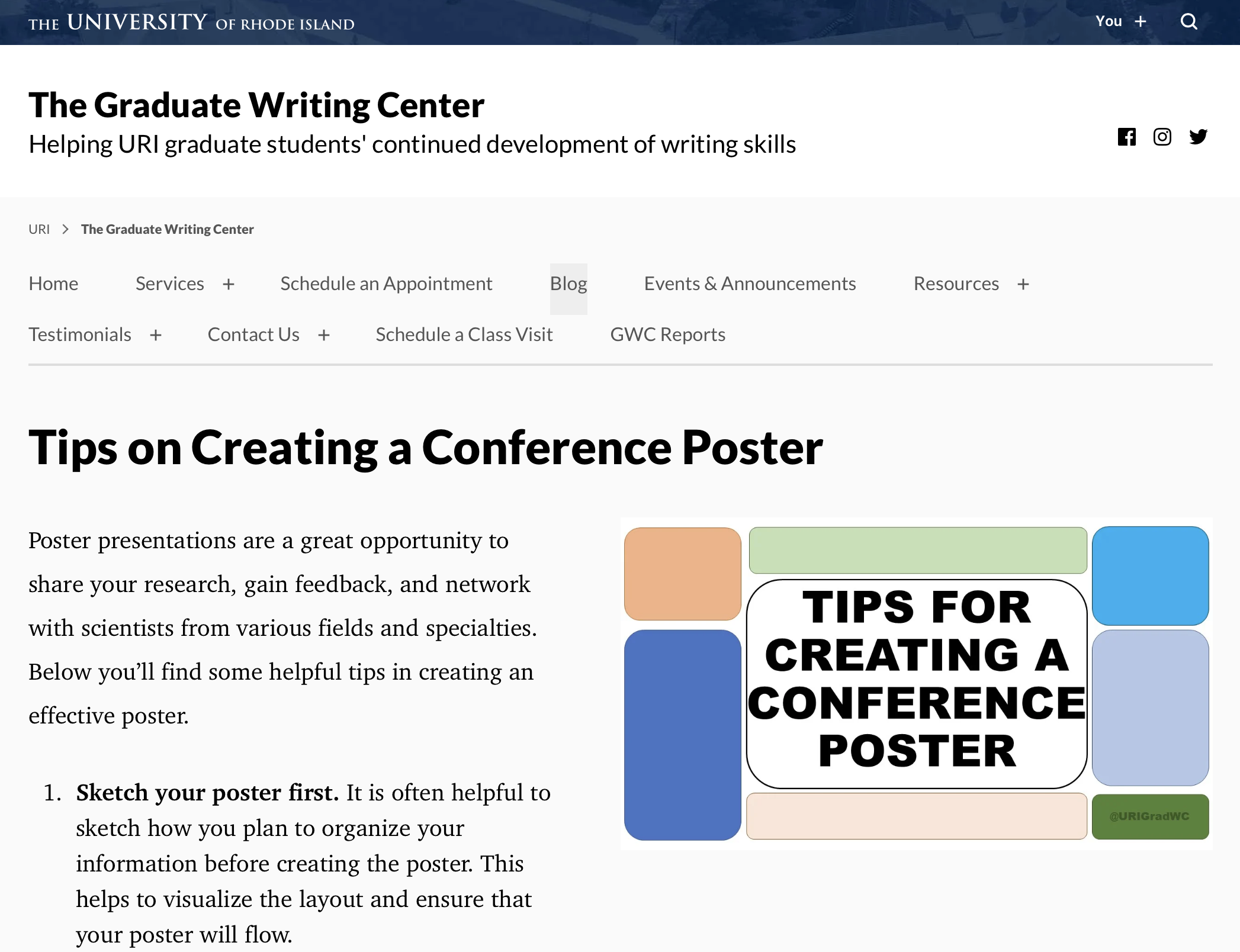
Tips on Creating a Conference Poster
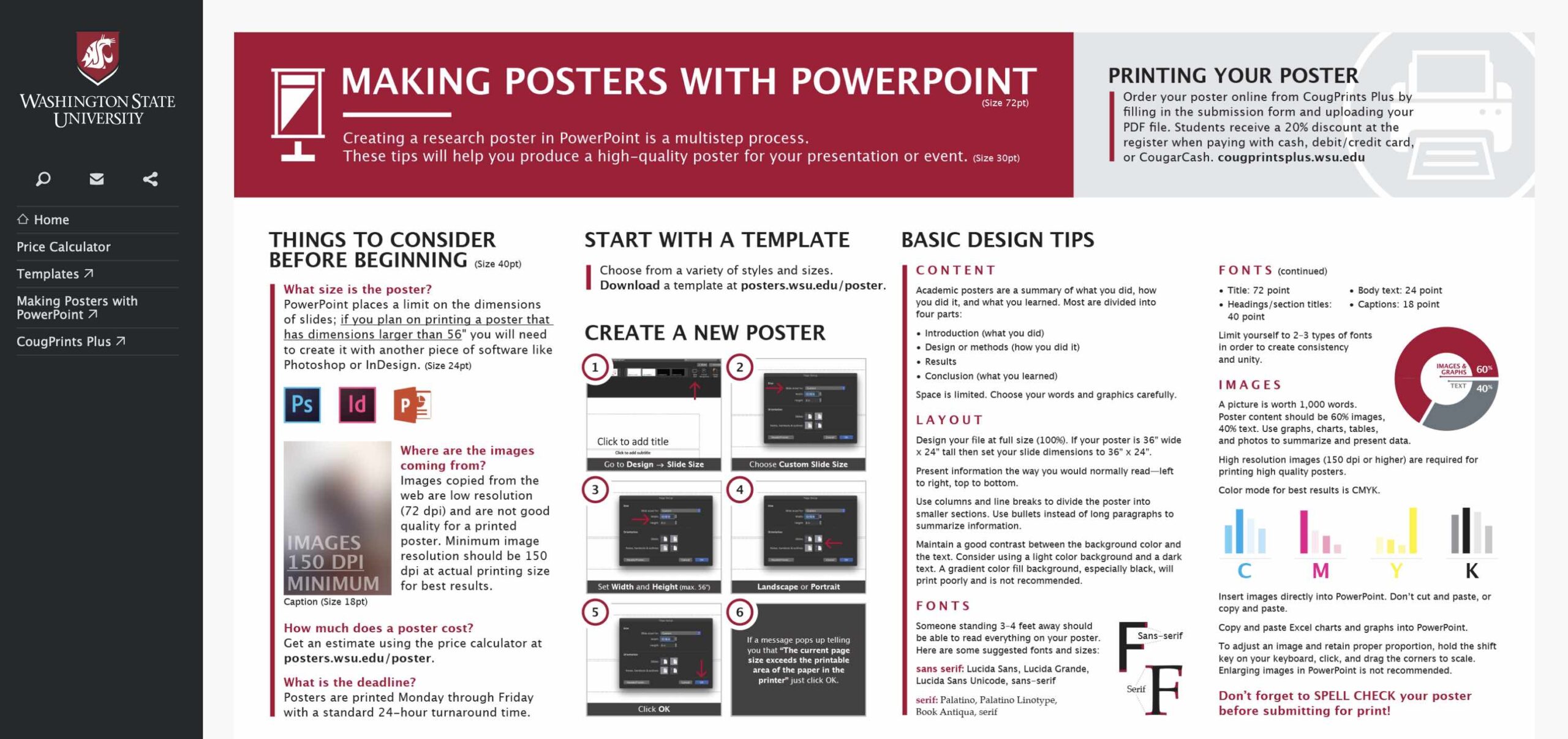
Making Posters With Powerpoint
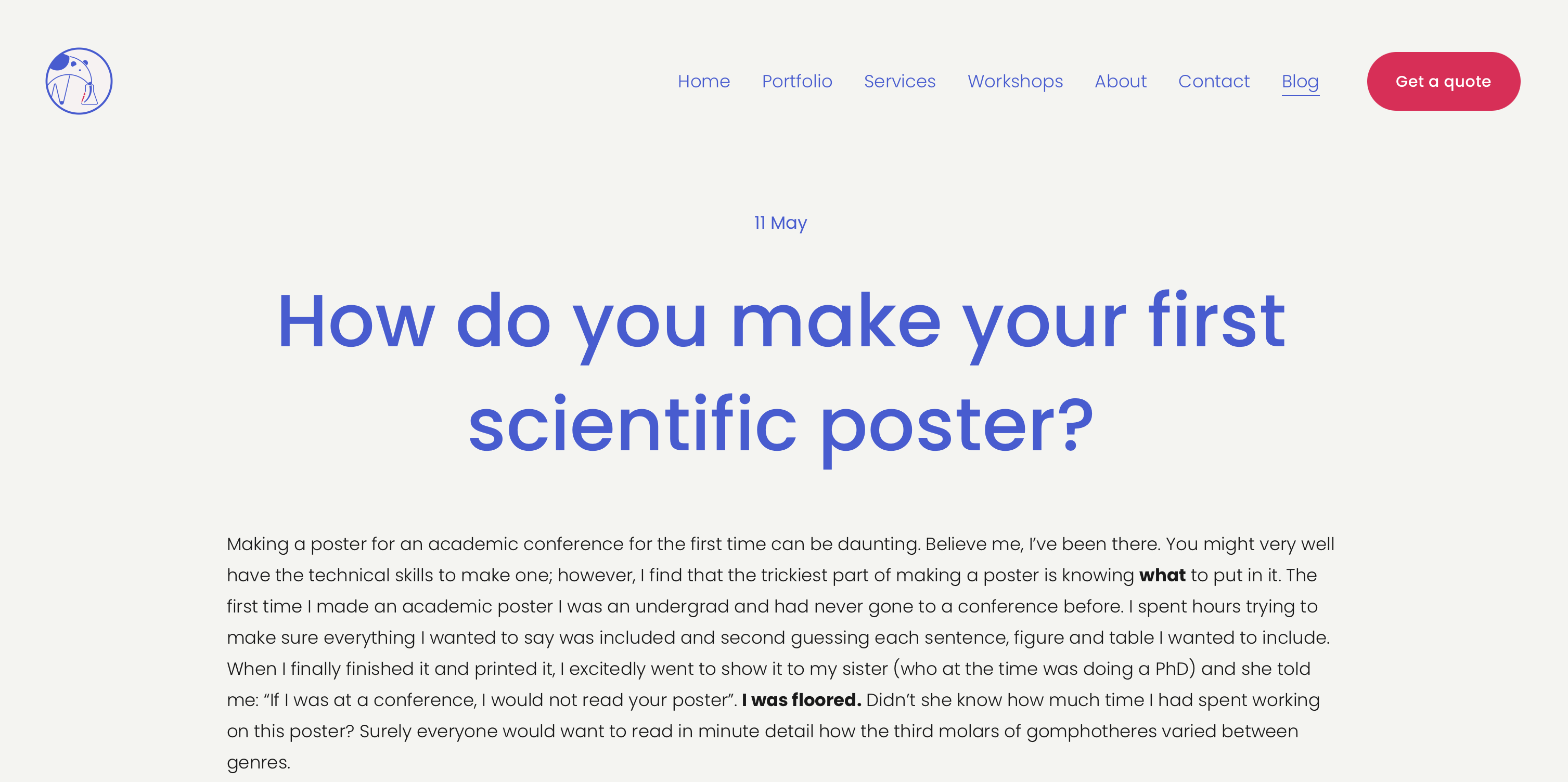
How Do You Make Your First Scientific Poster?
Presenting your poster
Posters are often shared at academic and professional conferences in “poster sessions,” a type of programmed conference session during which a group of presenters displays their posters to attendants who wander the poster exhibition. Poster presentations may be organized topically or thematically (e.g., climate health) or by affinity groups (e.g., public health students). They are often fairly unstructured, with attendees browsing the poster exhibition on their own, but poster sessions can sometimes also include “mini” oral presentations.
Before the session – At your poster session’s call time (the time at which you should be at the session for set-up), bring your poster and any materials for your poster presentation (e.g., copies of your abstract). Check with conference organizers to confirm the supplies you will need to attach your poster and bring them with you as well.
During the session – Presenters often stand near their posters during a poster session to answer attendees’ questions. This means you should know your poster backward and forward. To prepare, you might list questions that you expect from attendees and draft responses; you can also crowdsource questions from and test your responses with colleagues or friends. During the session, engage attendees by welcoming them to your space and proactively sharing your poster. You should have your contact information or a professional card available for attendees who may wish to contact you later. You should also be prepared to get contact information for attendees with questions you are not able to answer in real-time or who show special interest in your work.
After the session – Presenters are usually responsible for “tear-down” at the end of their session, meaning presenters remove their posters and clean up their space as needed. Soon after the session, follow up with attendees or co-presenters by email or LinkedIn. This is a chance to answer any questions or share any materials that you were unable to during the poster session, and a good way to network.
Build Your Network
What is networking?
Networking is the process of making connections and building relationships with other professionals in your field. It is getting to know others, learning about their work, and sharing about yours. Through networking, peers will often exchange contact information. This helps them to build their professional networks which can be a gateway to job opportunities and much more. Building relationships with peers in your field can expose you to new knowledge, resources, and connections that support your professional advancement.
How to build your network
There is no one right way to go about networking. Some people are very extroverted, they are comfortable meeting new people and quickly make professional connections. Others may be more introverted or shy and take more time to make connections. The main goal is to make those connections! Your approach will depend on you.
Sometimes people engage in networking with a specific goal in mind–to get a job, or promote their research or project. Other times people may not have a specific goal, but rather they seek to build connections and grow their networks which can have career benefits in the future.
Professional networks are comprised of closer ties–like your coworkers or classmates–as well as weaker ties–like colleagues you may meet at a professional meeting or conference. Often when we talk about networking we mean intentionally growing our network of weak ties. But networking also means maintaining connections. Building your network will entail growing new connections and maintaining existing ones.
Networking at Professional Conferences
Professional conferences are a great way to build and maintain your network–and the APHA Annual Meeting and Expo is no exception! The Annual Meeting is the premier public health event of the year, which means that there are plenty of opportunities to engage with other public health professionals. Whether at a dedicated networking session or waiting in line for coffee, there are endless opportunities to strike up a conversation with fellow professionals. You can even start networking before the conference begins by connecting with people through LinkedIn or through the conference’s website or app.
Kickstart your networking journey at the Public Health AmeriCorps Networking Gathering, which will take place at the APHA Annual Meeting on Sunday, November, 12, from 6:00 – 7:30 pm.
Get Started
Be Prepared
-
- Refresh your LinkedIn with new information and photos.
- Update your resume with new information.
- Get some business cards to hand out to new acquaintances.
Know Your Stuff
-
- Develop a pitch, and practice introducing yourself.
- Research your event.
- If you’re promoting your research or project, be prepared to talk about it. You may also want to have copies of abstracts to share.
Before an event
Successful networking starts with being prepared. Setting goals before a networking event can be helpful, whether you want to have conversations with a few people, or just one.
Researching events beforehand can be beneficial in case there’s a specific guest or speaker with whom you would like to connect.
During an event
Meeting new people, especially in professional settings, can be intimidating. It’s important to remember that we are all human, and even the most experienced professionals can get nervous in networking conversations. If you’re feeling stuck, ask people about themselves and their work, or what brought them to the conference. Be sure to give out your business cards during these conversations. You can jot down notes about your new acquaintance on their business card to help you remember your conversation better after the event.
After an event
Always be sure to follow up with the people you exchanged information with as soon as possible after an event. Sending an email or connecting on LinkedIn is a great start with a new professional acquaintance.
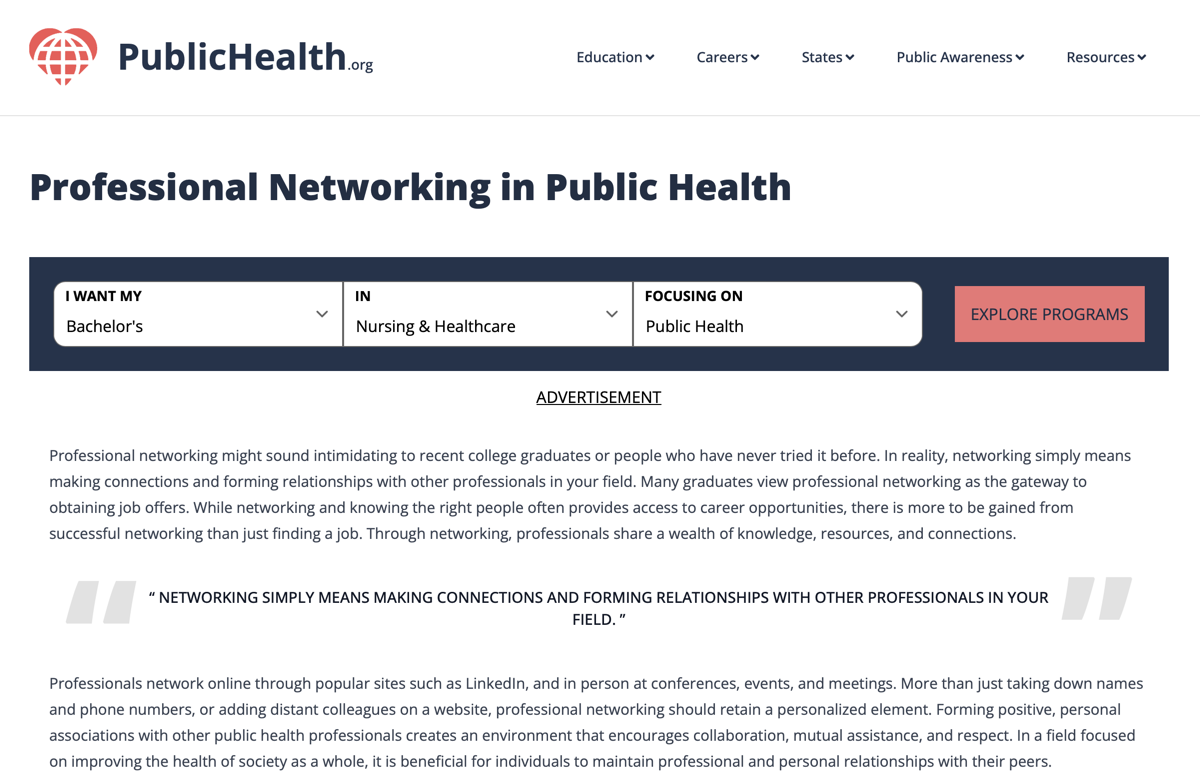
Professional Networking in Public Health
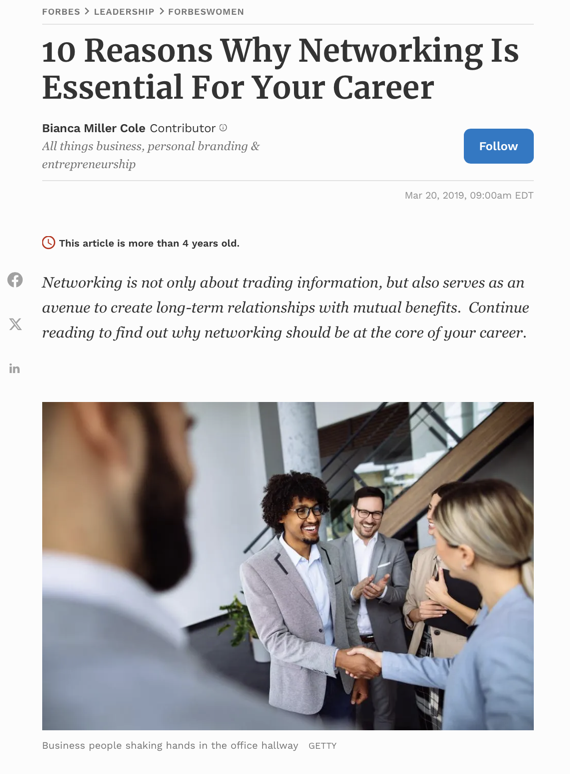
10 Reasons Why Networking Is Essential for Your Career
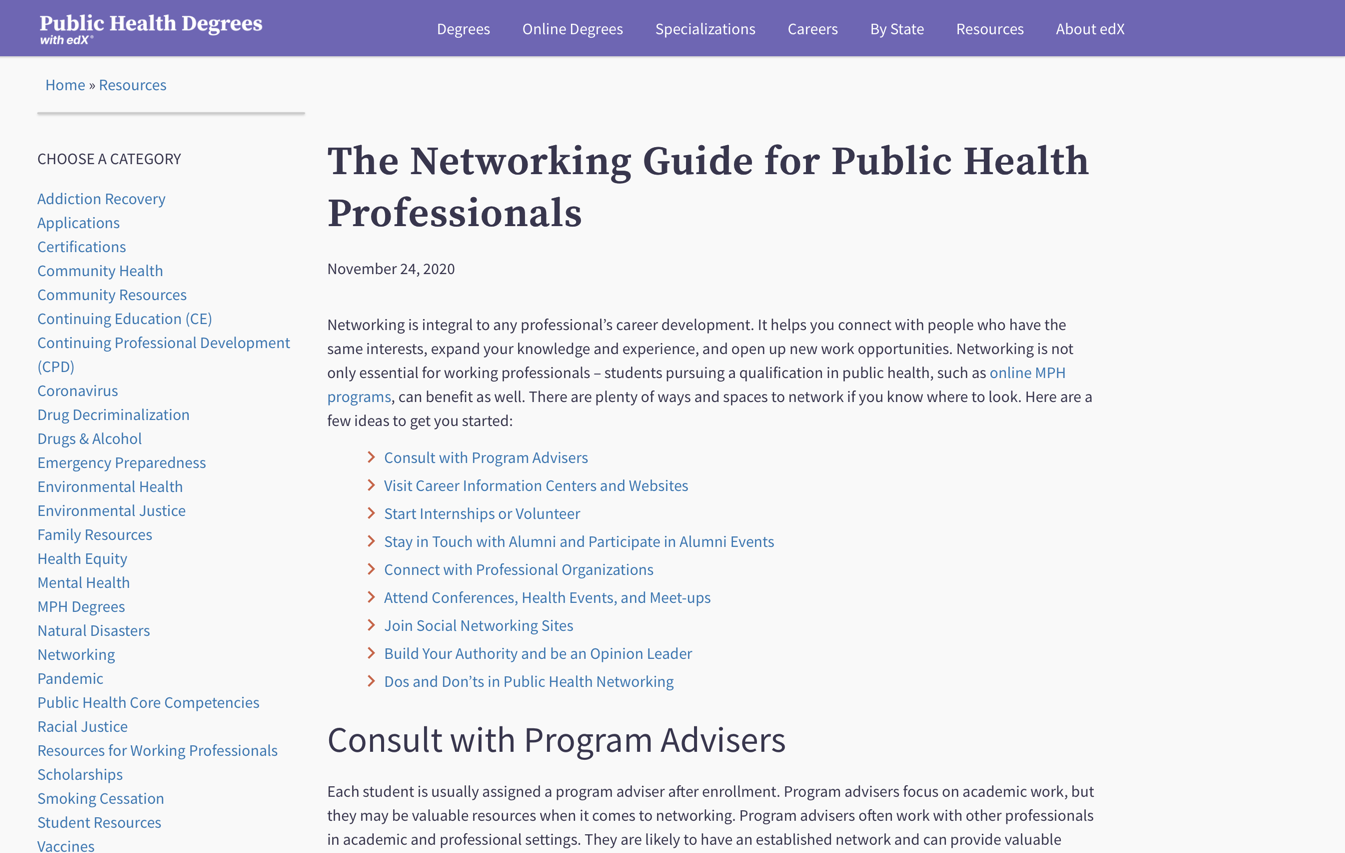
The Networking Guide for Public Health Professionals
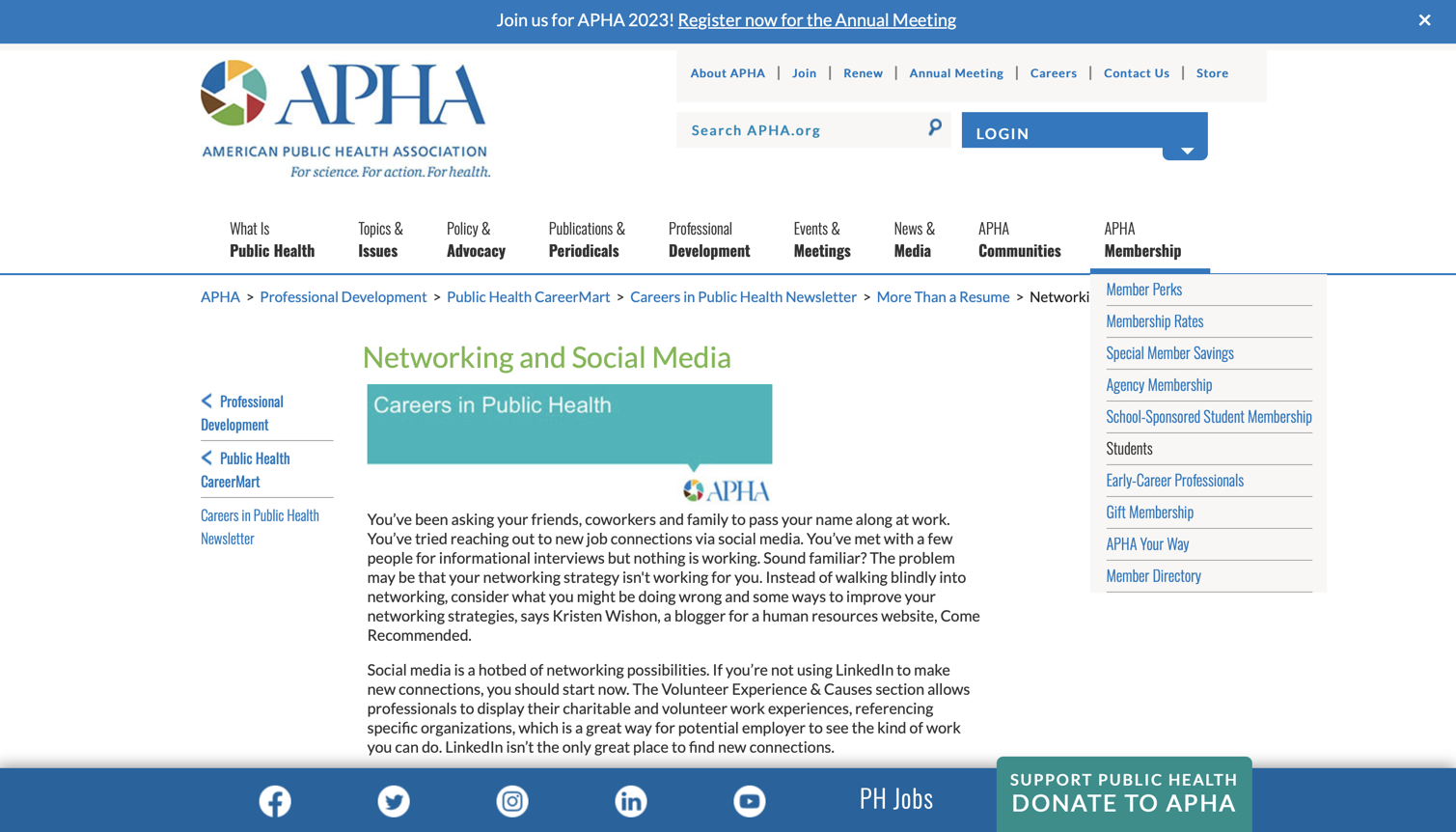
Networking and Social Media
Making the Most of Your Public Health AmeriCorps Experience Webinar Series
This webinar series from Public Health AmeriCorps and the American Public Health Association is open to all Members. It is designed to help Members grow knowledge and skills for a career in public health. Topics to include: writing an abstract, making a poster, networking and more.
Our next webinar, Poster Sessions 103, will be on October 10th at 3:30 PM ET
Register in advance for this webinar here.
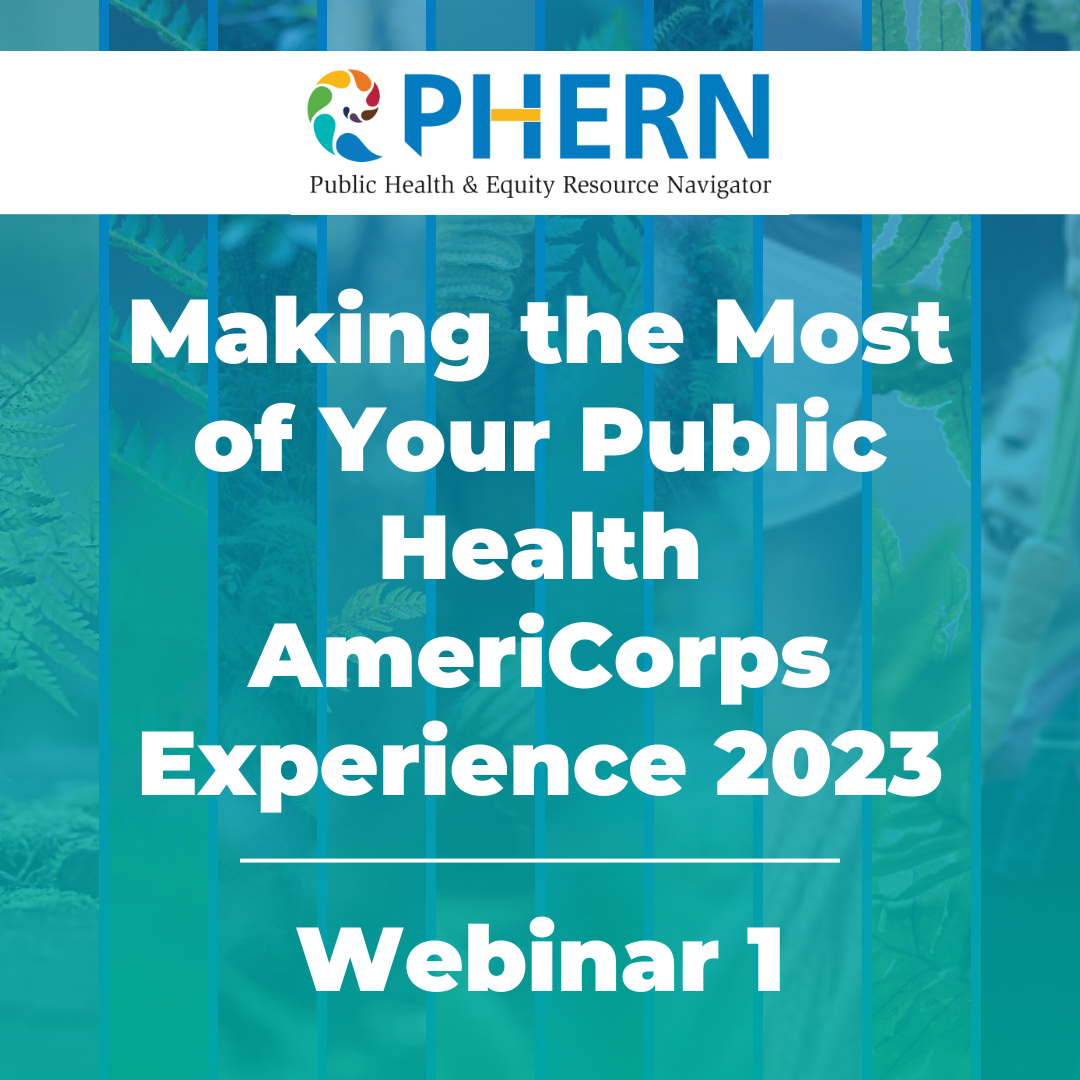
Making the Most of Your Public Health AmeriCorps Experience: Webinar 1
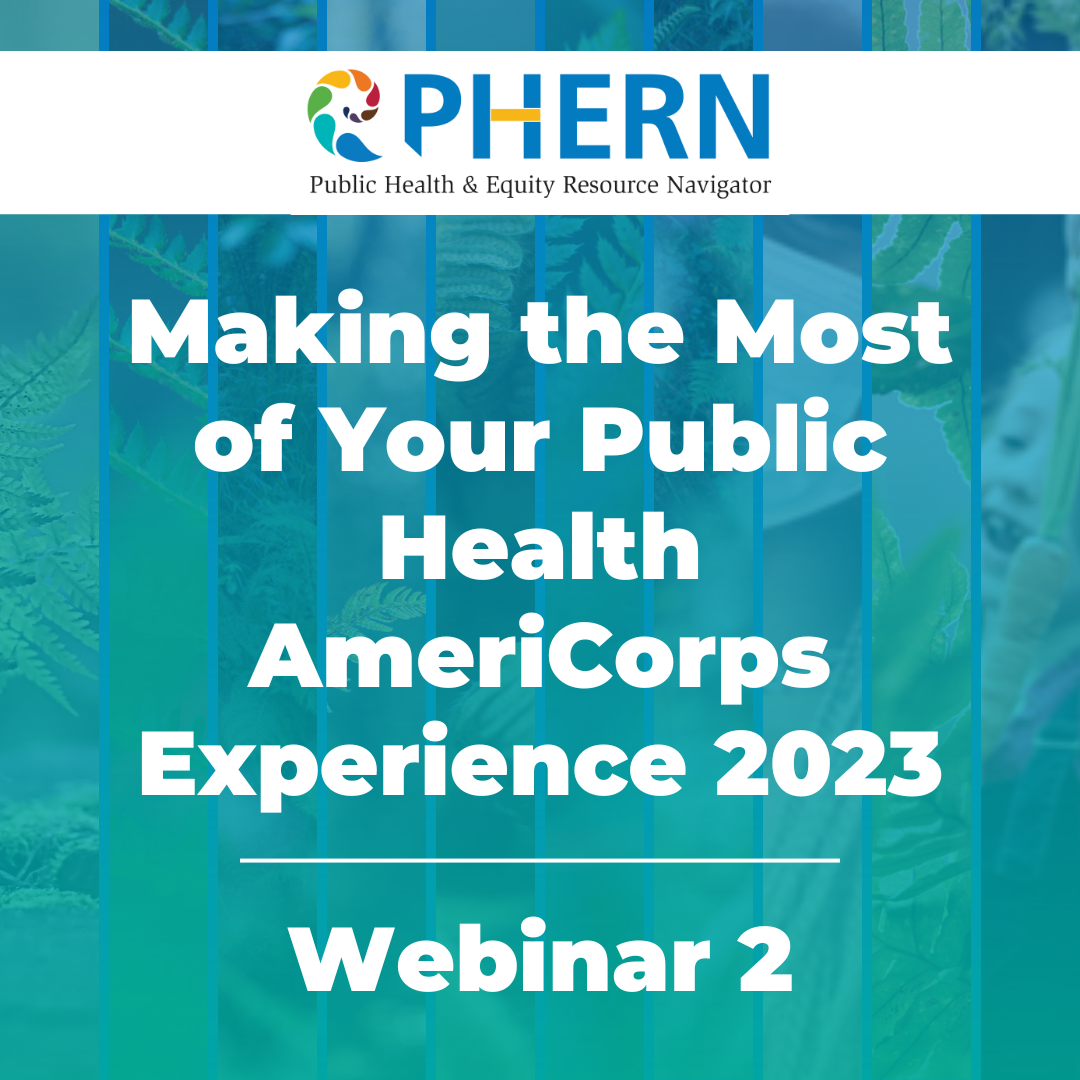
Making the Most of Your Public Health AmeriCorps Experience: APHA Annual Meeting Scholarships
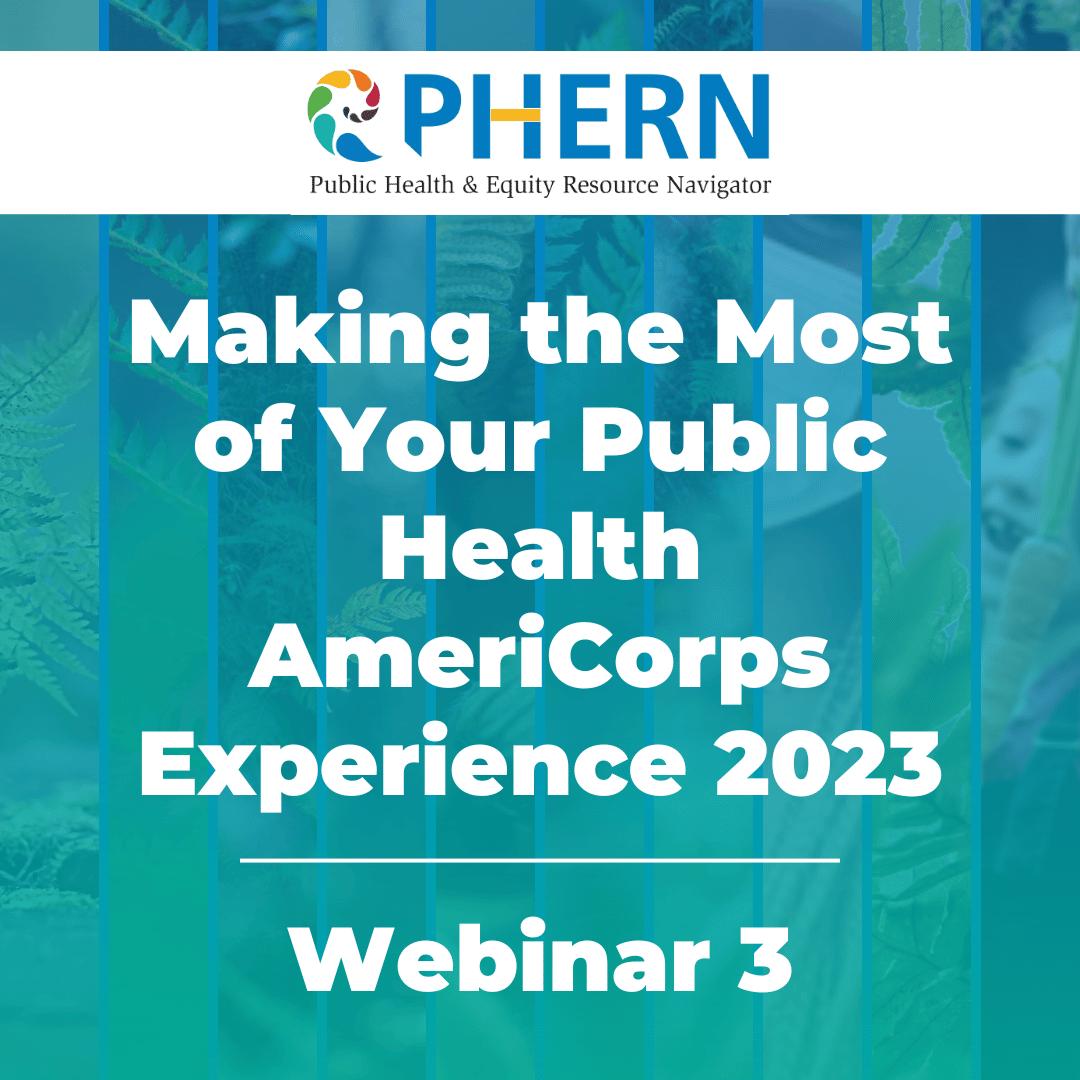
Making the Most of Your Public Health AmeriCorps Experience: Abstract Tips for APHA’s Annual Meeting

Making the Most of Your Public Health AmeriCorps Experience: APHA 2023 Application Tips
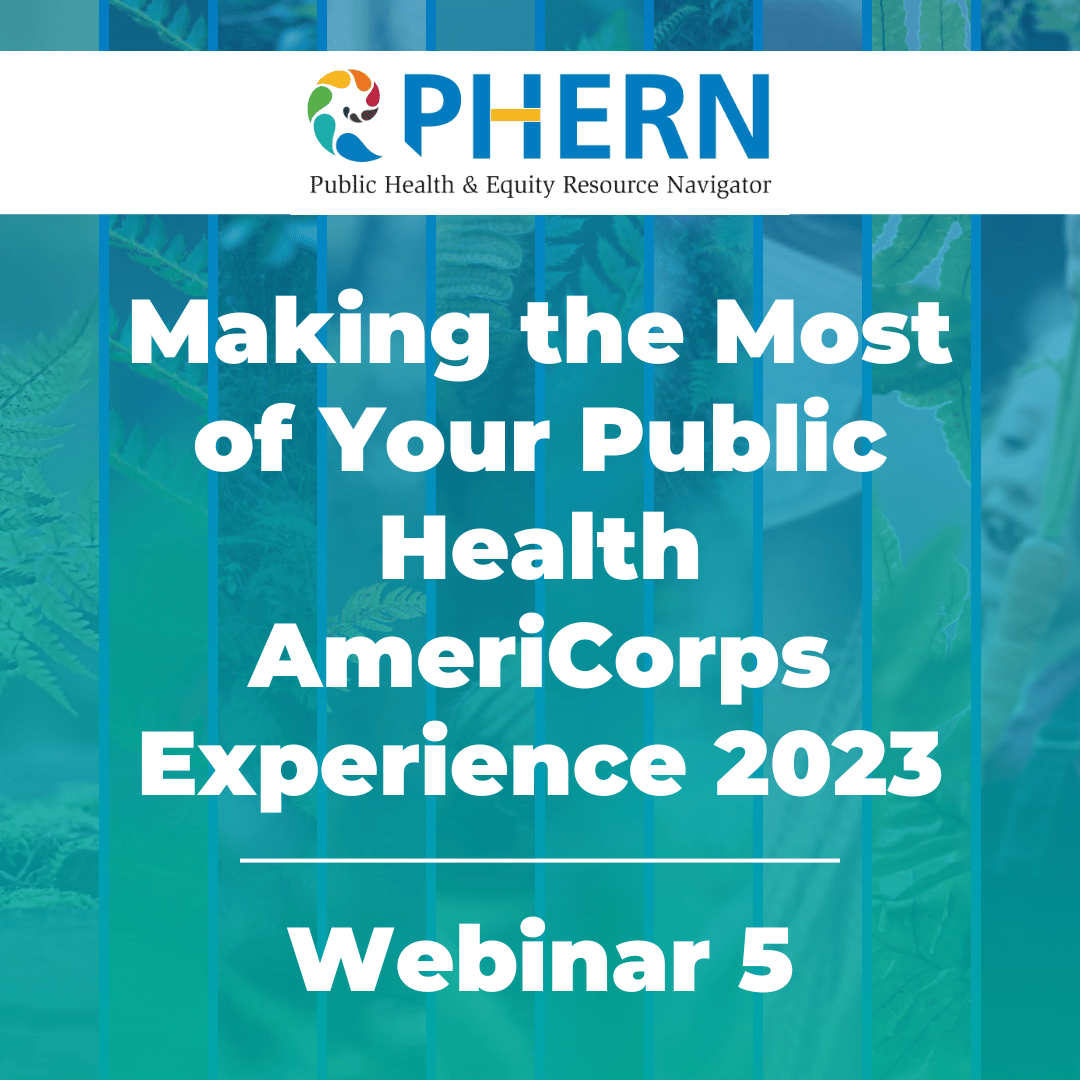
Making the Most of Your Public Health AmeriCorps Experience: Poster Sessions 101- What To Expect
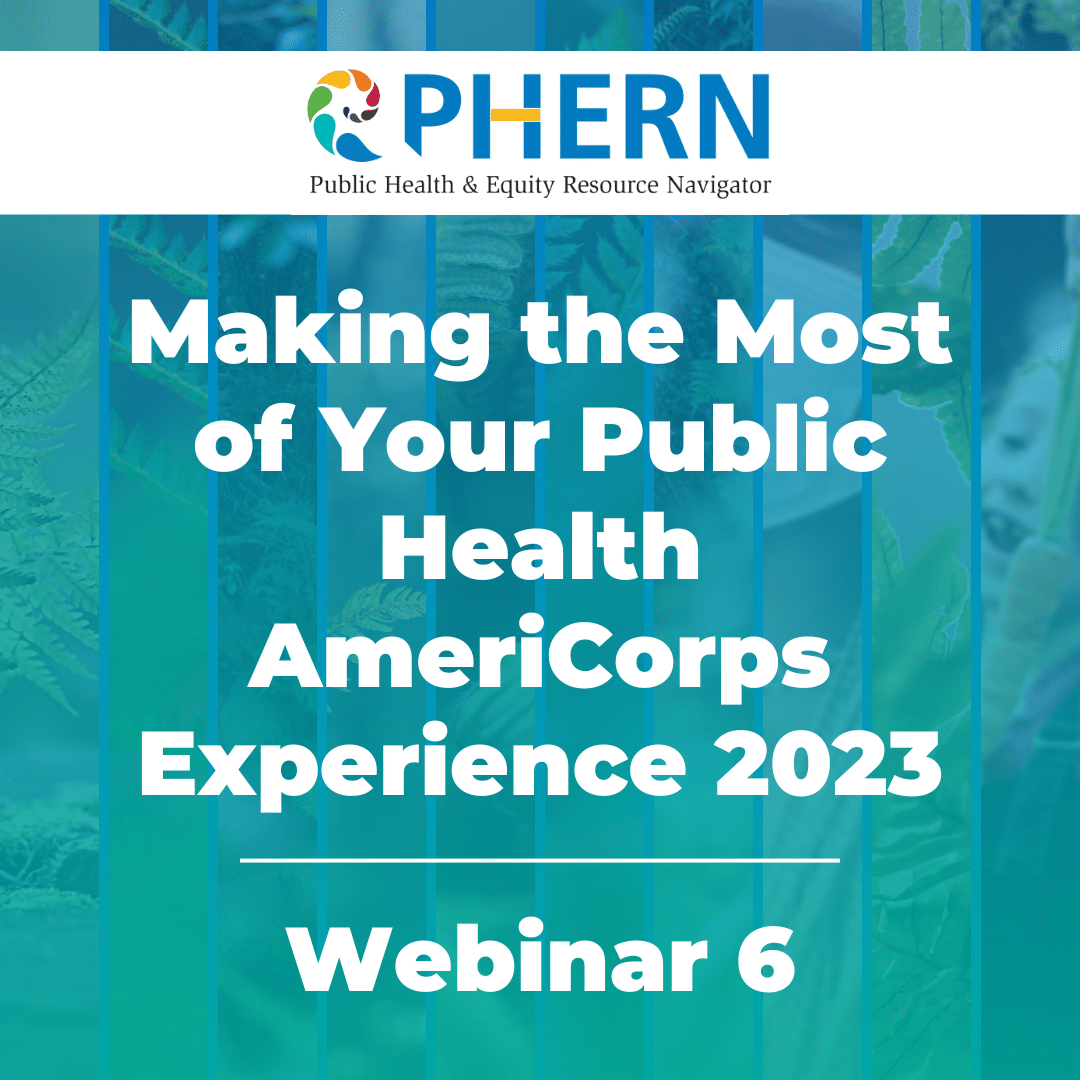
Making the Most of Your Public Health AmeriCorps Experience: Poster Sessions 102
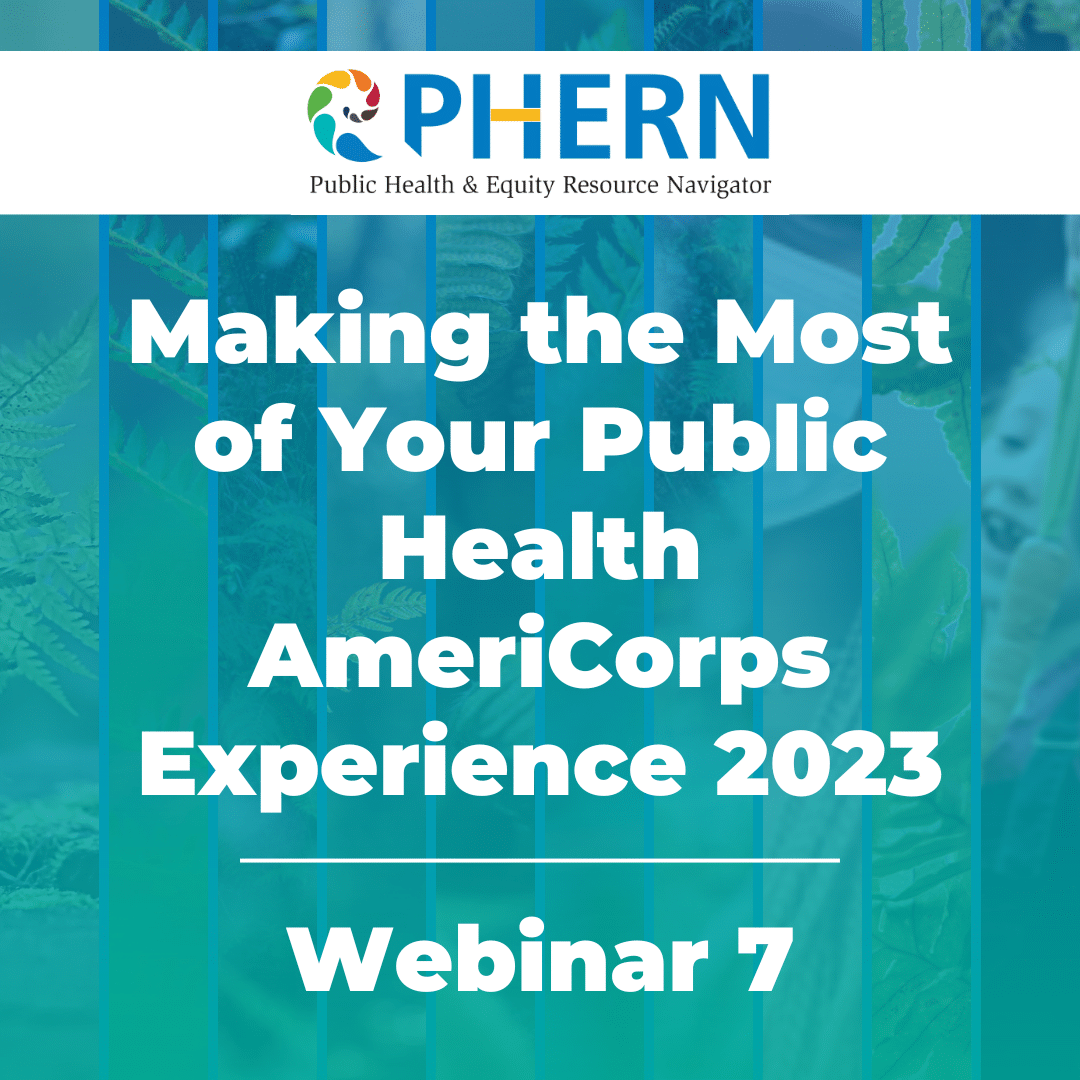
Making the Most of Your Public Health AmeriCorps Experience: Poster Sessions 103
Contact
American Public Health Association
800 I Street, NW
Washington, DC 20001
202-777-2742

